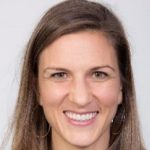
Dr Natalie Peach
‘Treating traumatic stress and substance use in emerging adults’
The Matilda Centre for Research in Mental Health and Substance Use, Sydney Medical School, University of Sydney, NSW
Awarded 2020
“This research will contribute to building the evidence for what treatments work best for these young people, with the goal of assisting in their recovery and increasing their overall functioning and wellbeing.”
Researcher Profile
Natalie Peach is a Postdoctoral Research Fellow at the Matilda Centre for Research in Mental Health and Substance Use, University of Sydney. She currently works as the Project Coordinator on the COPE-A clinical trial, investigating the efficacy of integrated exposure-based therapy for co-occurring post-traumatic stress and substance use disorders in adolescents.
She completed a combined Masters/PhD in clinical psychology at the University of Melbourne and Orygen Youth Health in 2017. Her PhD focused on phenomenological relationships between childhood trauma, PTSD symptoms and psychotic symptoms in young people with early psychosis. Her research interests include adolescent mental health, early intervention, PTSD, substance use, comorbidity and psychosis.
Project Summary
Posttraumatic stress disorder (PTSD) and substance use disorder (SUD) commonly co-occur in young adults aged 18-25 years, however there are no evidence-based psychotherapies that target these debilitating disorders together in this high-risk age group. This project will trial a 16-session cognitive behaviour therapy for co-occurring PTSD+SUD among emerging adults (COPE-EA), relative to a supportive counselling control therapy.
We expect that participants who receive COPE-EA will demonstrate greater reductions in PTSD symptom severity and substance use, and greater improvements in quality of life and social and occupational functioning.
Co-Investigators: A/Professor Katherine Mills, Dr Emma Barrett, Professor Maree Teesson, A/Professor Vanessa Cobham, Professor Sudie Back, Dr Sarah Bendall, Professor Sean Perrin, Professor Kathleen Brady and Professor Frances Kay-Lambkin